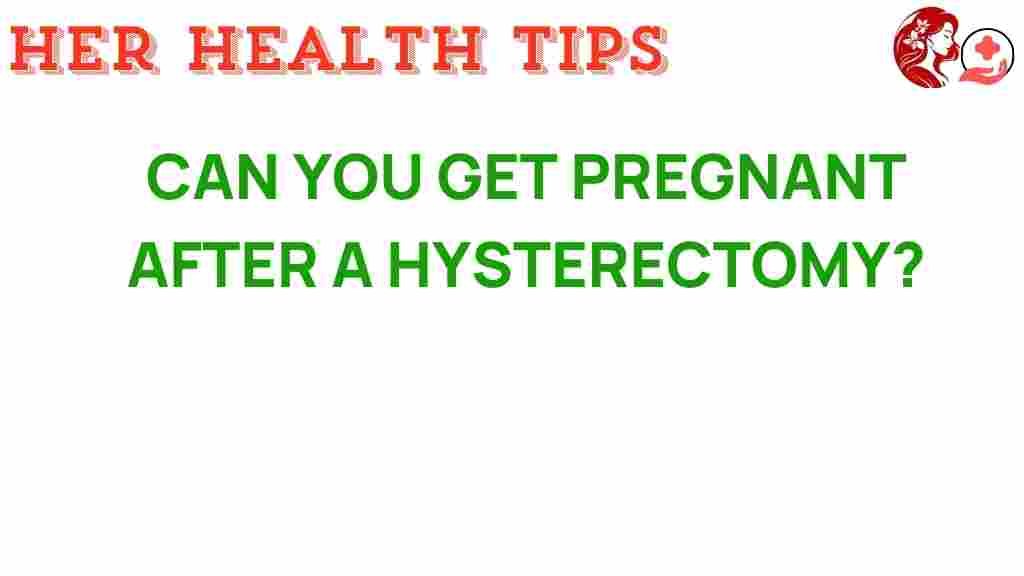The Surprising Truth: Can You Get Pregnant After a Hysterectomy?
When it comes to women’s health, hysterectomy is one of the most significant surgical procedures that can alter reproductive health. Women often have many questions and misconceptions about its implications for fertility and pregnancy. In this article, we will explore the intricate relationship between hysterectomy, pregnancy, and women’s reproductive health. We will address common misconceptions, provide medical insights, and discuss family planning options after surgery.
Understanding Hysterectomy and Its Types
A hysterectomy is a surgical procedure that involves the removal of the uterus. Depending on the medical condition, the surgery can vary in type:
- Total Hysterectomy: Removal of the entire uterus, including the cervix.
- Partial Hysterectomy: Removal of only the upper part of the uterus, leaving the cervix intact.
- Radical Hysterectomy: Removal of the uterus, cervix, surrounding tissues, and sometimes the ovaries and fallopian tubes.
Each of these procedures can dramatically affect a woman’s ability to conceive. Understanding these types is essential for grasping the implications for pregnancy later on.
Can You Get Pregnant After a Hysterectomy?
The straightforward answer is no; a woman cannot get pregnant after a complete hysterectomy because the uterus, where a fetus develops, is removed. However, there are nuances to consider:
1. Emotional and Psychological Impacts
Women often face emotional challenges post-hysterectomy, especially those who wish to conceive. The loss of the uterus can bring feelings of grief and loss, especially for women who were planning to have children.
2. Partial Hysterectomy and Fertility
In cases of a partial hysterectomy where the uterus is not entirely removed, there may still be a chance of conceiving if the ovaries remain intact and functional. However, this is rare and often comes with significant risks which should be discussed with a healthcare provider.
3. Surrogacy and Adoption
For women who have undergone a hysterectomy but wish to have children, options such as surrogacy or adoption may be viable paths. Surrogacy allows a woman to use her own eggs or embryos with another woman carrying the pregnancy, while adoption provides the opportunity to become a parent without pregnancy.
Common Misconceptions About Hysterectomy and Pregnancy
Several myths surround hysterectomy and its impact on women’s health and fertility. Here are some common misconceptions:
- Myth 1: Hysterectomy is the only solution for all female reproductive issues.
- Myth 2: After a hysterectomy, women cannot experience sexual pleasure.
- Myth 3: Hysterectomy leads to immediate menopause.
It is crucial to debunk these myths to foster a better understanding of reproductive health and to support informed decision-making regarding family planning.
Medical Insights on Hysterectomy and Reproductive Health
Healthcare providers usually recommend hysterectomy for various medical conditions, including:
- Uterine fibroids
- Endometriosis
- Uterine prolapse
- Cancer (uterine, cervical, or ovarian)
Each condition presents unique challenges, and the decision to proceed with a hysterectomy should involve careful consideration of all treatment options. Consulting with a specialist in women’s health can provide tailored medical insights and support.
Post-Surgery Considerations for Women’s Health
After a hysterectomy, women may face various changes in their bodies and health. It’s essential to prioritize women’s health through:
- Regular Check-ups: Routine visits to a healthcare provider to monitor recovery and manage any long-term effects.
- Hormone Replacement Therapy (HRT): Discussing options if the ovaries were removed and symptoms of menopause arise.
- Emotional Support: Seeking counseling or support groups to navigate feelings post-surgery.
Family Planning Options After Hysterectomy
For those who have undergone a hysterectomy, family planning may look different. Here are some options:
- Surrogacy: Engaging a surrogate mother to carry a pregnancy using the woman’s eggs or embryos.
- Adoption: Exploring adoption as a means to grow a family.
- Fostering: Providing a temporary home for children in need can also be fulfilling.
Each option comes with its unique considerations and emotional aspects, and exploring them thoroughly is vital.
Troubleshooting Common Concerns After Hysterectomy
Post-surgery, women may experience a range of concerns. Here are some common issues and troubleshooting tips:
1. Hormonal Changes
If the ovaries are removed, women might experience menopausal symptoms. Talking to a healthcare provider about HRT can help alleviate these symptoms.
2. Emotional Well-being
Feelings of sadness or loss are common. Seeking therapy or joining support groups can provide necessary emotional tools.
3. Physical Recovery
It is crucial to follow post-operative care instructions and attend follow-up appointments to ensure proper healing.
Conclusion
In conclusion, understanding the relationship between hysterectomy and pregnancy is crucial for women’s health. While a complete hysterectomy eliminates the possibility of natural conception, options like surrogacy and adoption remain viable. Addressing misconceptions and staying informed about reproductive health can empower women to make informed decisions regarding their family planning. If you have further questions about hysterectomy and its implications for your reproductive health, consulting a healthcare provider is always a wise step.
For more information on women’s health, you can visit WomensHealth.gov for comprehensive resources.
To learn more about family planning options, check out our detailed guide here.
This article is in the category Reproductive and created by HerHealthTips Team
